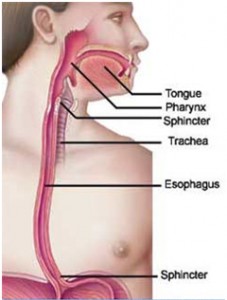Esophageal cancer is cancer that occurs in the esophagus — a long, hollow tube that runs from your throat to your stomach. Your esophagus carries food you 
Early esophageal cancer usually does not cause symptoms. However, as the cancer grows, symptoms may include painful or difficulty in swallowing, weight loss and coughing up blood. Risk factors for developing esophageal cancer include:
- Smoking
- Heavy Drinking
- Damage from acid reflux
- Difficulty swallowing (dysphagia)
- Weight loss without trying
- Chest pain, pressure or burning
- Fatigue
Type of Esophageal Cancer

Squamous Cell Carcinoma : Cancer that forms in squamous cells, the thin, flat cells lining the esophagus. This cancer is most often found in the upper and middle part of the esophagus, but can occur anywhere along the esophagus. This is also called epidermoid carcinoma.
Adenocarcinoma : Cancer that begins in glandular (secretory) cells. Glandular cells in the lining of the esophagus produce and release fluids such as mucus. Adenocarcinomas usually form in the lower part of the esophagus, near the stomach.
Esophageal Cancer Treatment in India
Surgery : Surgery is commonly used to treat esophageal cancer that has not spread beyond the esophagus and its surrounding lymph nodes. 
Chemotherapy : Chemotherapy is the use of drugs to kill cancer cells, usually by stopping the cancer cells’ ability to grow and divide.
Radiation therapy : The use of high-energy rays to damage cancer cells, stopping them from growing and dividing. Like surgery, radiation therapy is a local treatment that affects cancer cells only in the treated area.
Photodynamic Therapy : A form of treatment that uses a photosensitizing agent, administered by mouth or intravenously, which concentrates selectively in certain cells, followed by exposure of the involved tissue to a special light (such as laser or ultraviolet light), in order to destroy as much of the abnormal tissue
For some early (small) cancers, the esophagus can be removed through several small incisions instead of 1 or 2 large incisions. The surgeon puts a scope (like a tiny telescope) through one of the incisions to see everything d
Occasionally, the surgeon is unable to do the procedure laparoscopically and must convert to open surgery in order to make it safer for you. In this case, you will have an incision in the middle of your abdomen and your recovery will be longer. To help prevent blood clots from forming in your legs during and after surgery, sequential compression stockings may be applied.
What is the Benefit of Minimally Invasive Esophageal Cancer Surgery?
- Less Post-Operative Pain.
- Faster recovery and return to normal activity.
- Shorter Hospital Stay.
- Less Post-Operative Complications.
- Minimally Sized Incisions/Scars.
To know more about “Esophageal cancer Treatment” in India please check out this page https://safemedtrip.com/medical-services/cancer-treatment-in-india/esophageal-cancer-treatment-in-india.html

 Click to WhatsApp
Click to WhatsApp +91-9899993637
+91-9899993637



